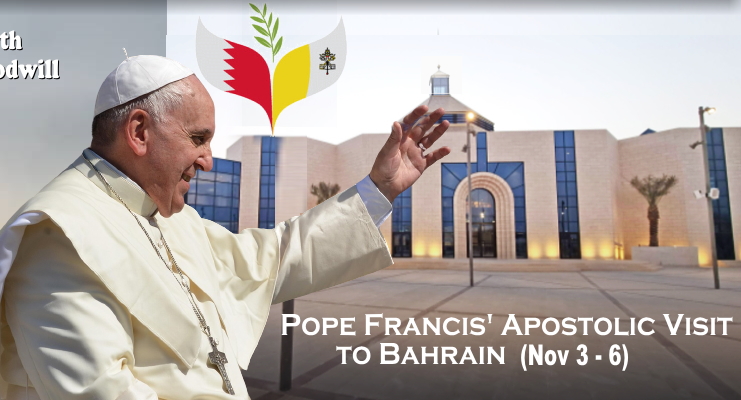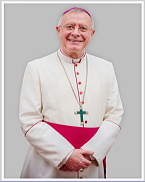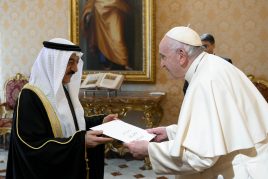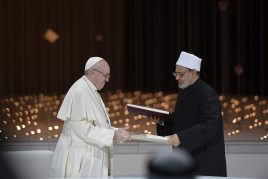
“We are looking forward to the arrival of Pope Francis with great joy and enthusiasm. We know that we have not been forgotten”, said Monsignor Paul Hinder, Vicar Apostolic of North Arabia (Bahrain, Kuwait, Qatar and Saudi Arabia), contacted by SIR on the eve of Pope Francis’ apostolic journey to Bahrain, November 3 to 6, on the occasion of the “Bahrain Forum for Dialogue: East and West for Human Coexistence.”
 Speaking to SIR, the bishop described the general sentiment of the local Christian and Catholic communities, the latter numbering approximately 80,000 on an overall population of just over 1,400,000. The Christian community in Bahrain comprises for the most part foreign migrants (about 240,000 according to estimates), from Asia – chiefly from the Philippines, the Middle East and the Indian subcontinent. The country, situated in the Persian Gulf, “is home to the oldest Christian community in the Arabian Peninsula, comprising about one thousand Arab-Christian faithful who migrated here from the Middle East in the early 1930s and who are now full citizens”, Msgr. Hinder points out. The beating heart of this small Christian flock is the Cathedral dedicated to Our Lady of Arabia in Awaii, the largest Catholic church in the Arabian Peninsula, built on a plot of land given to the Church by King Hamad bin Isa al-Khalifa. The Cathedral was consecrated by His Eminence Louis Antonio Cardinal Tagle, the Prefect of the Congregation of the Evangelization of Peoples, on 10 December 2021.
Speaking to SIR, the bishop described the general sentiment of the local Christian and Catholic communities, the latter numbering approximately 80,000 on an overall population of just over 1,400,000. The Christian community in Bahrain comprises for the most part foreign migrants (about 240,000 according to estimates), from Asia – chiefly from the Philippines, the Middle East and the Indian subcontinent. The country, situated in the Persian Gulf, “is home to the oldest Christian community in the Arabian Peninsula, comprising about one thousand Arab-Christian faithful who migrated here from the Middle East in the early 1930s and who are now full citizens”, Msgr. Hinder points out. The beating heart of this small Christian flock is the Cathedral dedicated to Our Lady of Arabia in Awaii, the largest Catholic church in the Arabian Peninsula, built on a plot of land given to the Church by King Hamad bin Isa al-Khalifa. The Cathedral was consecrated by His Eminence Louis Antonio Cardinal Tagle, the Prefect of the Congregation of the Evangelization of Peoples, on 10 December 2021.
 These gestures are further confirmation of the good bilateral relations existing between the Holy See and Bahrain established in January 2000. Last October 27th, Pope Francis received the Credential Letters of the new Ambassador of the Kingdom of Bahrain, Muhammad Abdul Ghaffar, during a private audience in the Vatican.
These gestures are further confirmation of the good bilateral relations existing between the Holy See and Bahrain established in January 2000. Last October 27th, Pope Francis received the Credential Letters of the new Ambassador of the Kingdom of Bahrain, Muhammad Abdul Ghaffar, during a private audience in the Vatican.
A time of Advent. “Bahrain has consistently been among the countries with the greatest degree of openness towards Christians and believers of other faiths,” emphasized the Vicar Apostolic. This small kingdom situated on the south-western coast of the Persian Gulf, comprising a small archipelago of 33 islands, has consistently offered “a unique platform for the encounter of peoples from the Far East and the Middle East, thus shaping its history, including that of the Churches.” This is also why Christians, Catholics and Muslims “share a common feeling of anticipation for the Pontiff’s forthcoming visit. This feeling recalls the spirit and the joy experienced during Pope Francis’ visit to the United Arab Emirates (UAE) in February 2019.” It was a historic event, marking the very first visit by a Pope to the Arabian Peninsula. On that occasion, Francis signed the “Document on Human Fraternity for World Peace and Living Together” in Abu Dhabi with Grand Imam Ahmad Muhammad Al-Tayyib, calling for rediscovering one another as brothers and sisters, promoting together human rights, peace, justice and religious freedom.
“From what I see and hear, I would described it as an ‘Advent’, a sentiment that favourably attunes with the similar, upcoming Time of Advent leading up to Christmas.
A strong sign. Amidst high expectations, the opportunities for local Christians to attend the public events envisaged in the program of the papal visit are “limited.” The biggest crowd will gather at the National Stadium in Awali, where Pope Francis will celebrate Holy Mass on November 5 “before 28,000 faithful, including believers coming from abroad, and not only from Bahrain. In fact no less than 2,000 Catholics are expected to arrive from neighbouring Saudi Arabia. Many more will follow the live broadcast on social networks. For all of them – remarks the Vicar Apostolic – this Mass will be a visible sign of acknowledgement of their existence as migrants.”
“The Pope’s visit to Bahrain, despite his physical difficulties, is a strong sign.”
A living Church. In Bahrain, said Msgr. Hinder, Pope Francis will find “a vibrant Church, with rich liturgies also attended by the faithful purposely arriving from neighbouring Saudi Arabia where the public practice of any religion other than Islam is prohibited. We faced a standstill during the Covid pandemic, but we are now resuming all religious services. Our problem is that we have insufficient room in our churches. The new Cathedral provides greater opportunities for us to carry out our pastoral activity. It is situated on the route to Saudi Arabia and therefore easily accessible for Christians from neighbouring areas. Our churches, despite the difficulties, radiate serenity and solidity.” The very same qualities recalled in the motto of the apostolic journey: “Peace on earth to men of good will” which, for Msgr. Hinder, “embodies the lifestyle of our faithful characterised by testimonies of peace, living together and dialogue.”
 The common thread of dialogue. In Bahrain, the Holy Father will take part in the “Bahrain Forum for Dialogue: East and West for Human Coexistence” and will have a private meeting – on November 4 – with Grand Imam of Al-Azhar, Ahmad Al-Tayyib, as he did in Abu Dhabi. “The friendship between the Pontiff and the Grand Imam plays an important role. Dialogue is a hallmark of this visit,” said the bishop. He pointed out: “There is a red thread uniting the historic journey to Abu Dhabi with the other successive visits made by the Pope”, up to the one to Kazakhstan last September. And now to Bahrain.
The common thread of dialogue. In Bahrain, the Holy Father will take part in the “Bahrain Forum for Dialogue: East and West for Human Coexistence” and will have a private meeting – on November 4 – with Grand Imam of Al-Azhar, Ahmad Al-Tayyib, as he did in Abu Dhabi. “The friendship between the Pontiff and the Grand Imam plays an important role. Dialogue is a hallmark of this visit,” said the bishop. He pointed out: “There is a red thread uniting the historic journey to Abu Dhabi with the other successive visits made by the Pope”, up to the one to Kazakhstan last September. And now to Bahrain.
“Bahrain is proud to serve as a platform for the continuation of dialogue,” he added. ” The presence of Pope Francis will provide a source of encouragement and a valuable opportunity for our faithful to grow in the faith.
“People here are facing great pressure and they fear they may have to leave the country as soon as they are out of work. This uncertainty weighs on the many migrants who have no reliable source of income to support their families. They thus hold on to their faith and live as true pilgrims in this world. This is the message they send out to all those who feel confident about their position.”










